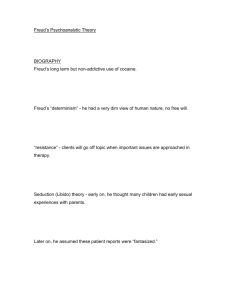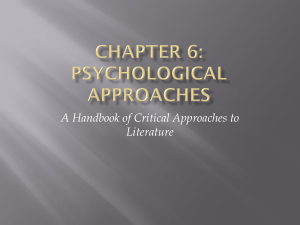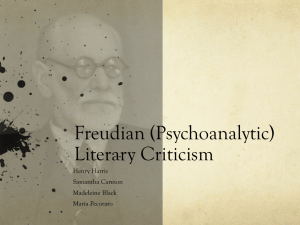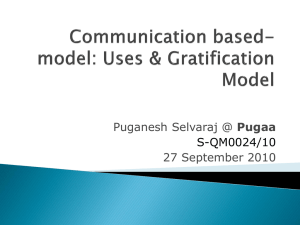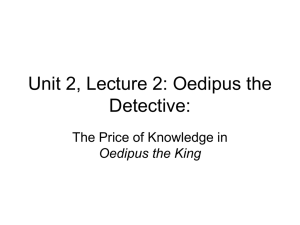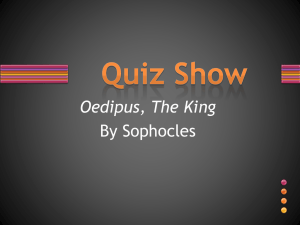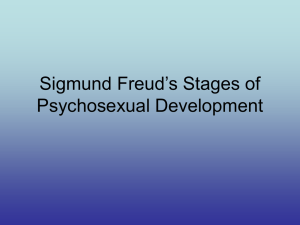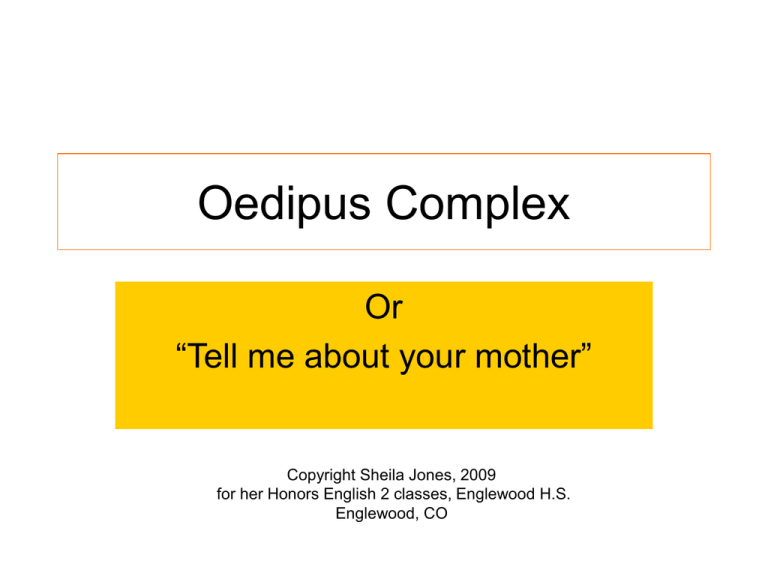
Oedipus Complex
Or
“Tell me about your mother”
Copyright Sheila Jones, 2009
for her Honors English 2 classes, Englewood H.S.
Englewood, CO
Sigmund Freud 1856-1939
• Considered father of modern
psychology
• Introduced psychological concepts,
though now considered obsolete, still
remain part of popular culture.
• Criticized for ignoring developmental
phases of women. Saw women as
inferior and defective.
Freud’s psychoanalytic
view of man
• The id: primitive, unconscious brain
• The ego: the personal, reality-based,
conscious mind
• The superego: conscience, our values
and morality
5 stages of
psychosexual development
based on primary source of sexual gratification
• Oral [0-8 months] Pure id. Gratification
involves use of the mouth.
• Anal [8-18 months] Toilet training stage.
Controlled by id. Child feels some
control over elimination and receives
gratification by either elimination
(aggressive, sadistic) or retention
(possessive, stubborn)
5 stages continued
• Phallic (18 months - 6 yrs.)
Preoccupation with genitals. Controlled
by id. Self-stimulation is major source of
gratification.
– Oedipal complex for boys. 5-6 years competiveness, achievement, ambition.
Attempt to outdo father
– Electra complex for girls.
5 stages continue
• Latency (6-11 years).
– Loss of interest in sexual gratification.
– Identification with same sex parent.
– Defensiveness vs. insecurity
– Adolescent competitiveness. Tendency to
show off.
Fifth stage, finally
• Genitality (11-18 years)
– Concern with adult modes of sexual
pleasure, barring fixations or regressions.
– Real object love
– Surplus energies lead to socially useful
functions
– Girls develop maternal interest.
Oedipal vs. Electra
Complexes
• Father/son
conflict
• Oedipus kills his
father, marries
his mother, and
when he figures
it out, gouges out
his eyes.
Oedipal vs. Electra
complexes
• Mother/daughter
complex
• A woman kills her
mother, Clytemnestra,
and her mother’s lover
to avenge the death of
her father Agamennon.
Significance of complexes
• To Freud, all young children have a
desire to do away with the like-sex
parent and take possession of the
opposite sex parent.
• Fear prevents children from doing this
because the parent is bigger and
stronger.
Oedipal Complex in Phallic Stage
• Son is torn between love of his father and
hatred for him, stemming from jealousy
• Castration complex: Castration is father’s
possible retaliation.
• This is reinforced when boy sees girl’s
anatomy; she appears castrated.
• Thus, the boy represses his incestuous
desire for his mother and hostility to his
father.
Oedipal Complex in Latency Stage
• Superego is strong enough to defeat the id and the
Oedipal and Electra complexes are resolved.
• Oedipus’ lack of knowledge of his parents OR his
arrogance indicate a lack of superego
development.
• Oedipus allows id to control him. He acts on
instinct when he kills Laius and marries Jocasta–
libidinal fixation.
• In the latency stage, Oedipus recognizes his crime
and gouges out his eyes in self-punishment.
Oedipal Complex and Jocasta
• Jocasta denies her maternal behaviors
(genitality).
• To Freud, Jocasta was narcissistic.
• She fixated in the phallic state, seeking
only her personal gratification,
regardless of consequences.
• She can not admit her mistake, so she
commits suicide.

